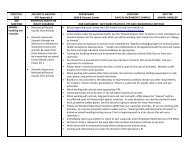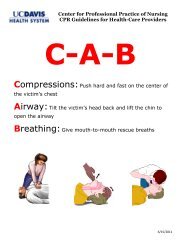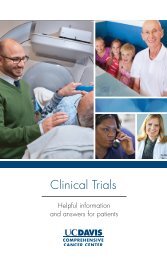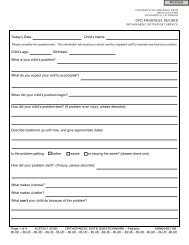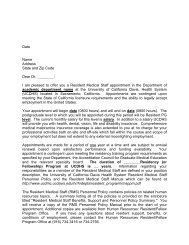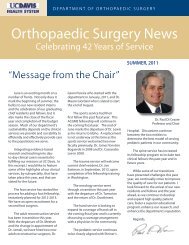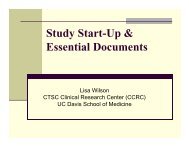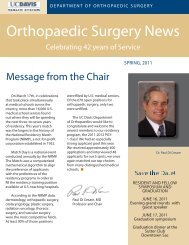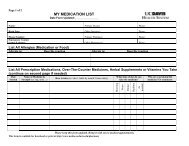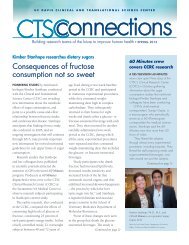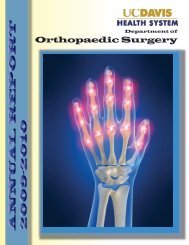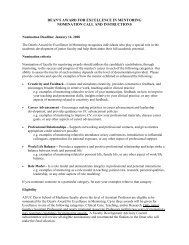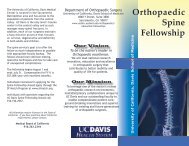Resident Handbook - UC Davis Health System
Resident Handbook - UC Davis Health System
Resident Handbook - UC Davis Health System
- No tags were found...
You also want an ePaper? Increase the reach of your titles
YUMPU automatically turns print PDFs into web optimized ePapers that Google loves.
Bleeding from the nose, urinary tract, stomach, or colon. Bleeding may also occur in or aroundthe brain (intracranial). In extreme cases, bleeding can result in death.Contact the clinic staff or seek emergency care immediately if any of the following occur:severe headache, dizziness, any abnormal bleeding including from the nose, urinary tract,stomach, or rectum.Your lab values will be monitored frequently while you are on this medication. It is importantthat the medical staff know what your values are so the medication can be adjusted as needed.The risk of bleeding can be increased if you are taking certain other medication or herbalproducts. Make sure that your provider and nurse have a complete list of all the medications andherbal products that you take. Contact your provider if you begin a new drug or supplementto see if additional testing is necessary.See below for some information on drug, food and herbal interactions.Enoxaparin (Lovenox) : Herb/Nutraceutical: Avoid cat's claw, dong quai, evening primrose,feverfew, garlic, ginger, ginkgo, red clover, horse chestnut, green tea, ginseng (all may increasethe risk of bleeding).Warfarin (Coumadin): Foods high in vitamin K inhibit the anticoagulant effect of warfarinincluding beef liver, pork liver, green tea, and leafy green vegetables. Do not change dietaryhabits once stabilized on warfarin therapy. A balanced diet with a consistent intake of vitamin Kis essential. Avoid large amounts of alfalfa, asparagus, broccoli, Brussels sprouts, cabbage,cauliflower, green teas, kale, lettuce, spinach, turnip greens, and watercress. It is recommendedthat the diet contain a CONSISTENT vitamin K content of 70-140 mcg/day. Check withhealthcare provider before changing diet.WARFARIN – EFFECTS OF FOODS AND SUPPLEMENTSWhat you eat can have an important effect on how much warfarin you need to maintain theproper amount of anticoagulation. You should continue to eat your normal diet. Do not makeany major changes such as: starting a weight loss diet, going on an eating binge, begin takingvitamin and mineral supplements, or alter the amount of alcohol you ordinarily drink. If youplan to make a change in your eating or drinking habits, check with your provider first.Vitamin K can also alter your anticoagulation therapy when taking warfarin. Below is a list offoods high in Vitamin K. TRY NOT TO CHANGE YOUR USUAL CONSUMPTION OF THEFOLLOWING FOODS:Page 130 of 153C:\Documents and Settings\dhutak\Desktop\rshb13.doc



